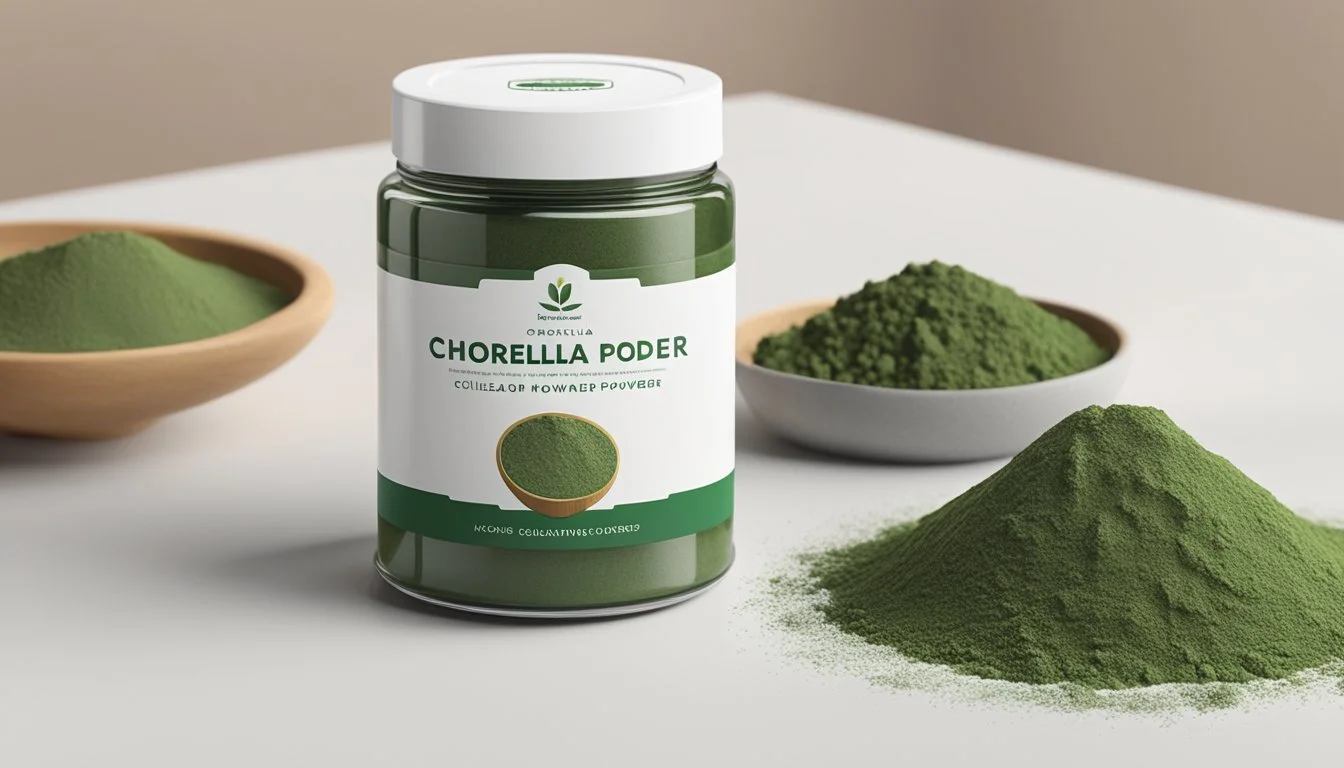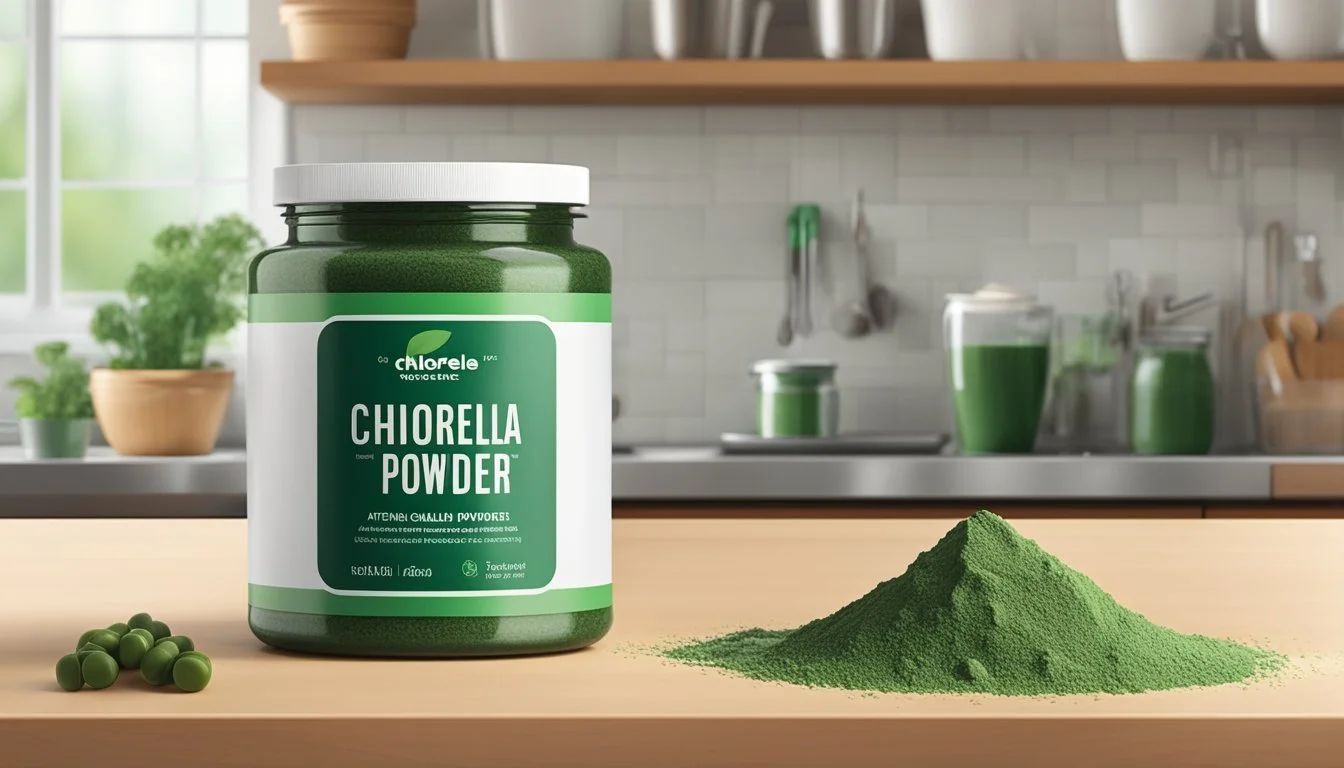Chlorella Powder Substitutes
Top Alternatives for Optimal Nutrition
When looking for substitutes for Chlorella powder, it’s important to find options that offer similar nutritional benefits. Chlorella powder is a type of green algae rich in vitamins, minerals, and protein. These substitutes should ideally provide comparable health benefits and nutrients without drastically changing your recipes.
Chlorella powder can be replaced with spirulina, barley grass powder, and moringa. Spirulina, another algae, boasts high protein content and essential fatty acids. Barley grass powder is another excellent option, packed full of antioxidants and essential vitamins such as B1, B2, B12, and C. Meanwhile, moringa is renowned for its high antioxidant content and diverse nutrient profile.
These alternatives ensure that you do not miss out on the nutritional advantages offered by Chlorella powder. Whether you are seeking to enhance your diet with vital nutrients or simply looking for variety, these substitutes provide tremendous health benefits that align closely with those of Chlorella.
Understanding Chlorella
Chlorella is a type of green algae that is found in freshwater. It is known for its impressive nutrient profile, making it a popular dietary supplement.
Nutrients in Chlorella:
Protein: Chlorella is rich in protein, often containing all nine essential amino acids.
Vitamins: It provides important vitamins such as A, B12, C, and K.
Minerals: This algae is a good source of minerals including iron, magnesium, and zinc.
Chlorella is notable for its high content of chlorophyll, which gives it its distinct green color. Chlorophyll has been studied for its potential health benefits.
Antioxidants found in chlorella may help reduce oxidative stress and support overall health. These compounds can protect cells from damage caused by free radicals.
Rich in omega-3 fatty acids and fiber, chlorella contributes to heart health and proper digestive function. Unlike omega-6 fats, omega-3s are often lacking in many diets, making chlorella a valuable addition.
In summary, chlorella offers a broad spectrum of nutrients that may support various aspects of health. It is a versatile supplement that can be easily incorporated into a daily routine.
Table: Nutrient Content in Chlorella:
Nutrient Description Protein High in essential amino acids Vitamins Includes A, B12, C, and K Minerals Contains iron, magnesium, and zinc Chlorophyll Known for potential health benefits Antioxidants May reduce oxidative stress Omega-3 Fats Supports heart health Fiber Aids in digestion
Understanding the nutrient-rich composition of chlorella can help individuals make informed decisions about incorporating this powerful supplement into their diets.
Nutritional Profile of Chlorella Powder
Chlorella powder is renowned for its dense nutrient content, providing a range of proteins, vitamins, minerals, fats, and phytonutrients. This section explores the key nutrients found in Chlorella powder in detail.
Protein and Amino Acids
Chlorella powder is a potent source of protein, containing up to 60% of its dry weight as protein. This makes it comparable to some of the highest protein-rich foods. It includes all nine essential amino acids, necessary for various body functions such as tissue repair and muscle growth.
Essential Amino Acids in Chlorella:
Isoleucine
Leucine
Valine
Lysine
Methionine
Phenylalanine
Threonine
Tryptophan
Histidine
This complete set of amino acids supports numerous metabolic processes and promotes overall health.
Vitamins and Minerals
Chlorella is rich in a variety of vitamins and minerals, which contribute to its status as a nutrient-dense food. Key vitamins include vitamin A, vitamin C, vitamin E, and B vitamins such as riboflavin, thiamin, niacin, and folate.
Notable Vitamins:
Vitamin A: Supports vision and immune function.
Vitamin C: Acts as an antioxidant and supports skin health.
Vitamin E: Protects cells from oxidative damage.
Vitamin K: Essential for blood clotting.
Key Minerals:
Iron: Important for blood production.
Magnesium: Vital for muscle and nerve function.
Calcium: Crucial for bone health.
Zinc: Plays a role in immune response.
Potassium: Regulates fluid balance and muscle contractions.
Fats and Fatty Acids
Chlorella contains beneficial fats, including essential fatty acids like omega-3 and omega-6. Although it is not particularly high in fat, the fats it does contain are important for maintaining heart and brain health.
Key Fatty Acids:
Omega-3: Anti-inflammatory properties and supports cardiovascular health.
Omega-6: Required for normal growth and development.
These polyunsaturated fats are crucial for various biological processes and maintaining a healthy balance of omega-3 to omega-6 fatty acids is vital.
Phytochemicals and Antioxidants
Chlorella is rich in phytochemicals and antioxidants, which help protect the body from oxidative stress and support overall health. Key compounds include chlorophyll, carotenoids such as beta-carotene, lutein, and zeaxanthin, and other antioxidants like phycocyanin.
Important Phytochemicals and Antioxidants:
Chlorophyll: Known for its cleansing properties.
Beta-carotene: A precursor of vitamin A and acts as an antioxidant.
Lutein and Zeaxanthin: Vital for eye health.
Phycocyanin: Offers anti-inflammatory and antioxidant benefits.
These compounds help reduce damage caused by free radicals and support essential bodily functions.
Health Benefits of Chlorella
Chlorella, a nutrient-dense microalga, offers a wide array of health benefits. These include bolstering the immune system, supporting heart health, aiding in detoxification, enhancing digestive health, and boosting energy and metabolism.
Immune System Support
Chlorella may enhance immune function due to its rich nutrient content.
Nutrients: It contains essential vitamins and minerals such as vitamin C, iron, and zinc. These play a crucial role in maintaining and boosting immune health.
Antioxidants: The presence of antioxidants like carotenoids and chlorophyll supports the body in defending against free radicals, potentially reducing inflammation and offering protection from oxidative stress.
Immune Response: Studies suggest chlorella can increase the production of antibodies, fortifying the body's defense mechanisms against infections and diseases.
Cardiovascular Health
Chlorella contributes to heart health in several significant ways.
Cholesterol: It helps reduce LDL (bad) cholesterol levels and triglycerides, promoting a heart-healthy lipid profile.
Blood Pressure: Regular consumption of chlorella has been linked to reduced blood pressure. Its content of potassium, arginine, and omega-3 fatty acids helps in maintaining healthy arterial function.
Heart Disease: By lowering cholesterol and blood pressure, chlorella reduces the risk of heart disease and stroke, making it an integral part of cardiovascular health management.
Detoxification Effects
Chlorella aids in detoxifying the body from harmful substances.
Heavy Metals: It binds to heavy metals and other toxins, effectively removing them from the body. This includes metals like cadmium and lead, which can accumulate over time.
Toxins: The high fiber content supports the detox process by aiding in the elimination of waste and toxins through the digestive system.
General Detox: Chlorella also supports liver function, crucial for filtering and eliminating toxins.
Digestive Health
Chlorella positively influences digestive health.
Fiber: Its fiber content promotes regular bowel movements and supports overall digestive function. Aiding in the prevention of constipation.
Probiotics: It can act as a prebiotic, fostering the growth of beneficial gut bacteria essential for digestion and absorption of nutrients.
Inflammation: The anti-inflammatory properties of chlorella can help soothe the digestive tract, reducing symptoms of conditions such as irritable bowel syndrome (IBS).
Energy and Metabolism
Chlorella can boost energy levels and improve metabolic functions.
Nutrition: It is packed with proteins, vitamins, and minerals that provide sustained energy. The presence of B vitamins supports energy production.
Metabolic Rate: Chlorella helps stimulate metabolic processes, potentially aiding in weight management and fat reduction.
Hormonal Balance: By helping regulate hormones, chlorella can enhance overall energy levels and reduce fatigue, promoting better physical performance.
Potential Side Effects and Considerations
Chlorella supplements are generally considered safe for most people. However, some individuals may experience mild side effects.
Common side effects include digestive discomfort. This can manifest as diarrhea or gas. It's advisable to start with a small dose to monitor how the body reacts.
Individuals with specific dietary needs or those under medical supervision should consult their health care provider before starting Chlorella. This is crucial to avoid any potential interactions with medications or existing conditions.
Some people might experience allergic reactions. Symptoms can include rash, itching, or swelling. If any severe side effects occur, it is important to stop taking the supplement and seek medical advice immediately.
Quick Tips for Safe Use:
Start Small: Begin with a low dose.
Monitor Health: Watch for any adverse reactions.
Consult Professionals: Seek advice from a health care provider, especially if you have specific dietary needs or health conditions.
Despite its benefits, Chlorella is not suitable for everyone. Understanding potential side effects ensures safer use and maximizes its benefits.
Chlorella Powder in Dietary Supplements
Chlorella is a versatile alga supplement, available in various forms such as capsules, tablets, and as an addition to foods and beverages. It offers numerous health benefits due to its rich nutritional profile.
Capsule and Tablet Forms
Chlorella is often consumed in capsule or tablet forms. These methods provide a convenient way to take the supplement daily. Capsules and tablets contain measured doses, making it easy to control intake. They are especially useful for people who do not enjoy the taste of chlorella powder.
The nutritional benefits remain intact in these formats. Capsules and tablets are often preferred for their long shelf life and ease of transport. Additionally, these forms ensure consistency in dosage, which is important for those using chlorella for specific health goals like boosting iron intake or supporting immune function.
Integration into Foods
Chlorella powder can be easily integrated into various foods. It can be added to smoothies, juices, soups, and even baked goods. This method is ideal for those who prefer a more natural approach to supplementation. Adding chlorella to foods allows for better absorption and utilization of its nutrients, including vitamins D and B12, as well as iron and folate.
For smoothies, a teaspoon of chlorella powder blends well with fruits and vegetables, enhancing the nutritional value without overpowering the taste. In juices, it can be mixed with citrus or other strong flavors to mask the taste. It’s also becoming popular in green health drinks sold in many health food stores.
Label and Dosage Recommendations
When using chlorella supplements, it is crucial to follow label and dosage recommendations. The typical dosage ranges from 2 to 6 grams per day, depending on individual health goals and needs. Labels should be checked for purity and the presence of any additives or fillers.
Dosages may vary between products, so users should start with the lower end of the recommended range to avoid potential side effects like gas or nausea. Reading the label also helps identify whether the product is non-GMO, organic, or free from contaminants, crucial points for maintaining health and safety.
Alternatives to Chlorella Powder
For those seeking to replace chlorella powder, there are several excellent options that provide comparable nutritional benefits. Alternatives such as other algae, plant-based substitutes, and superfoods rich in essential nutrients can serve as effective replacements.
Spirulina and Other Algae
Spirulina is a well-known alternative to chlorella powder. This blue-green algae is rich in protein, vitamins, and minerals. Spirulina contains essential amino acids, B vitamins, vitamin C, and iron. It is also high in antioxidants and fatty acids, making it a potent superfood.
Another substitute is barley grass powder. Packed with antioxidants, amino acids, and essential vitamins such as B1, B2, B12, and C, barley grass powder offers similar health benefits to chlorella. It provides high concentrations of potent phytochemicals and can be used in a variety of recipes.
Plant-Based Substitutes
Moringa is a nutritious plant-based substitute for chlorella powder. Rich in antioxidants, essential vitamins, and minerals, moringa provides significant health benefits. It is particularly high in vitamin A, vitamin C, calcium, and potassium. This makes moringa a versatile superfood for those looking to boost their nutrient intake.
Wheatgrass is another excellent plant-based option. It contains a high concentration of chlorophyll, vitamins, and minerals. Wheatgrass is known for its detoxifying properties and is often used in smoothies and juices. It's a great source of vitamins A, C, and E, as well as iron, magnesium, and calcium.
Hemp seeds also serve as a viable alternative. They offer a robust protein content, healthy fats, and a good amount of fiber. With essential fatty acids like omega-3 and omega-6, hemp seeds support overall wellness and can easily be added to a variety of dishes.
Importance of Essential Nutrients
When selecting a substitute for chlorella powder, it's crucial to consider the importance of essential nutrients. These alternatives should provide a balanced array of vitamins and minerals to support overall health.
Protein content is vital for muscle repair and growth. Algae like spirulina and plant-based substitutes like hemp seeds are excellent sources.
Fiber aids digestion and supports gut health. Options such as barley grass powder and moringa offer significant fiber content.
Fatty acids like omega-3 and omega-6 are essential for brain function and cardiovascular health. Hemp seeds and spirulina provide these crucial nutrients, ensuring your dietary needs are met.
By carefully selecting from these alternatives, one can maintain a balanced and nutrient-rich diet.






